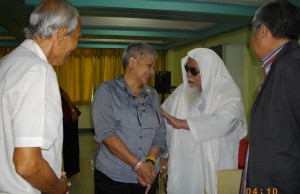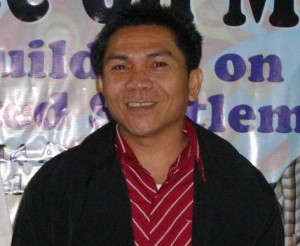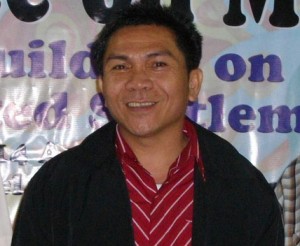“MY son wants to be an MILF commander,” said 38-year-old Abdulbasit Benito, a peace advocate based in Cotobato City. “He wants to fight soldiers because they are causing displacement and poverty.”
Benito’s son, Hareeth Djibril, is eight years old and likes to play war games with his friends and classmates, imagining they are fighters of the Moro Islamic Liberation Front (MILF). Hareeth enjoys watching Star Wars, the Japanese manga series Naruto whose main character is an adolescent ninja, and TV programs showing aircraft carriers and war planes.
But Benito, executive director of Bangsamoro Center for Justpeace, is doing everything he can to help end the war in Mindanao so that Moros can return to a normal life. After all, he suffered from that war.
“I was a victim of war. I was born in an evacuation center. My mother and sister died of hunger in an evacuation center. I don’t want my children to experience that,” Benito said.
Benito’s fears are not isolated. More than 100 other advocates representing various organizations echoed his call for peace during the National Solidarity Conference on Mindanao (NSCM) held over the weekend at the University Hotel at the University of the Philippines in Diliman, Quezon City.
The conference sought to build consensus on a negotiated political settlement to the conflict between the government and the MILF during this holy month of Ramadhan, when Muslims all over the world turn inwards, contemplating Allah’s word by reading the Holy Qur’an, the Muslim holy book, and praying. Fighting is not allowed during this month.
After 30 days of fasting from dawn to dusk, the MILF will once more sit at the negotiating table with the Philippine government for a new round of peace talks.
The war between the Philippine government and the Moro rebels has resulted in the death of about 120,000 soldiers, rebels and civilians. To date, there are more than 1.6 million internally displaced people; thousands live in evacuation centers while others have migrated to Luzon and the Visayas, according to Prof. Rabi Angcal who spoke on the perspectives from the Bangsamoro grassroots.
The war in Mindanao erupted in the early ’70s, but its roots date back to the colonial period when the Moro sultanates fought the Spanish conquistadores and their Christianized native subjects. The systematic settlement of Mindanao by natives of Luzon and the Visayas started during the American occupation and increased heavily after the creation of the Republic of the Philippines in 1946.
The Moros, however, are not the only victims of this war. The lumads, or non-Muslim indigenous ethnic groups in Mindanao, have their own stories to tell.
 “A rich political family stole our ancestral land in the 1970’s to extend their ranch. We had been living there for centuries. Then one day, we couldn’t go home anymore because their cows were roaming all over and armed men from the Philippine Constabulary had taken over,” recalled Bae Magdalena Suhat Herbilla of the Manobo Tribal Council.
“A rich political family stole our ancestral land in the 1970’s to extend their ranch. We had been living there for centuries. Then one day, we couldn’t go home anymore because their cows were roaming all over and armed men from the Philippine Constabulary had taken over,” recalled Bae Magdalena Suhat Herbilla of the Manobo Tribal Council.
She was 17 then. Now 50, she could still remember the events clearly. “We had nowhere to go to so we had to live in evacuation centers. We took the matter to court and they gave us back only 500 hectares. But we couldn’t return to our land because the armed men were still there,” she said.
“We are tired of constantly evacuating. We always lack food, our people always get sick and our children do not get the proper education,” she lamented.
Bae Magdalena’s ancestral land spanned mountains with virgin forests, vast lowlands, rolling hills and winding rivers. Now, they occupy only a portion because wealthy, political families have acquired the titles to large tracts of their land.
The Manobos in North Cotobato number around 35,000 and derive their income from farming. For the Moros, Manobos and other indigenous groups like the Tagabawa and Matigsalog, land is communally owned and tilled. Land titling was not practised by the Moro and non-Moro indigenous peoples of Mindanao.
Bae Magdalena said they have not resorted to arms although they would not hesitate to do so if pushed to the limit. “We want to try negotiations first. So we choose peace. But I don’t know if the settlers will want to negotiate with us,” she said. “We are asking for tribal municipalities so we can create a province for all (non-Moro) indigenous peoples in Mindanao.”
Although the peace talks involve only the government and the MILF, the stakeholders to the outcome are many. In the past few years, calls for peace have emanated from the Moros, the indigenous groups, and the Christian settlers.
Even the European Union, which supports the peace-building efforts of various groups, “stands ready to continue its support for peace and development in Mindanao and intensify this support as the process moves forward,” said EU First Secretary Holger Rommen.
The EU will be joining the International Monitoring Team for the peace process and will lead its Humanitarian, Rehabilitation and Development component.
Several peace agreements have been signed between the Moro rebels and the Philippine government. The Tripoli Agreement in 1976 and the Jakarta Accord in 1996 were signed between the Moro National Liberation Front and the Philippine government under the auspices of the Organization of Islamic Conference.
In 2008, the government initialled the Memorandum of Agreement on Ancestral Domain (MOA-AD) with the MILF. But political uproar in Manila forced the government to abort the formal signing of the agreement in Malaysia. The Supreme Court eventually declared the MOA-AD unconstitutional. Despite the various international agreements, peace in Mindanao has been elusive.
“The government is addressing an insurgency situation while the MILF is searching for a lasting formula to address the age-old Moro question,” said Mike Pasigan of the MILF Peace Panel Secretariat who spoke in behalf of MILF Peace Panel Chair Mohager Iqbal.
“Our position is for the establishment of a state and sub-state form of governance, while the government repeated its offer of enhanced autonomy which is patterned after the present Autonomous Region in Muslim Mindanao,” he said.
Pasigan believes the public’s lack of understanding of the MOA-AD doomed it from the start. The creation of a sub-state would need changes in the Constitution, and panic set in when critics claimed the MOA-AD would dismember the Republic. But, Pasigan said, “The Republic is already dismembered.” He clarified that an agreement with the MILF would make the country whole again.
“We are not fighting for an Islamic state. We are fighting for the Bangsamoro. We want independence but we will be satisfied with a sub-state. That is our compromise,” Pasigan reiterated.
He added, “If we do not change the Constitution, the peace process will go nowhere.”
Marvic Leonen, who heads the government peace panel and is current dean of the UP College of Law, agreed with Pasigan that “the talks will not start from scratch.”
“The MOA-AD has a complex history but within the MOA-AD there are agreements that we can work on,” noted Leonen.
He believes there is no immediate need to amend the Constitution because “it provides a lot of space for a politically negotiated settlement.” A constitutional amendment, he says, is not easy to commit because it would “need the approval of the entire Filipino people”.
 But he stressed the present government’s willingness to negotiate with the MILF. “It is not the intention of the government to engage in war. The only arm to be deployed is the arm of peace,” he stated.
But he stressed the present government’s willingness to negotiate with the MILF. “It is not the intention of the government to engage in war. The only arm to be deployed is the arm of peace,” he stated.
Teresita Quintos-Deles, presidential adviser on the peace process, reassured the group that the Constitution “will not be a stumbling block to the peace process”.
“Constitutional change is constitutional,” she reminded the group.
She also expressed confidence in the legal competence of the government panel. “It’s going to be really hard work at the negotiating table but our panel is ready for that,” she stressed.
Deles talked about President Aquino’s over-arching policy that rests on governance so the presence of government will be felt all over the country, development and the delivery of basic health, education and livelihood services, economic recovery and sustainable development even in the conflict zones of Mindanao. She also discussed the need for security sector reform to ensure that security forces do not have partisan interests.
But it seems the government will have to do extra work to rebuild the people’s confidence in the negotiations. According to Sheikh Jamil Yahya, several Moro groups doubt the sincerity of President Noynoy Aquino. “Why has he not appointed a single Muslim Filipino to his Cabinet or to a position in his government till now?” he asked.
Sheikh Yahya was the imam who declared a fatwa (“official” religious opinion) asking the Moros not to vote for 2010 presidential candidate Joseph Estrada, vice presidential candidate Mar Roxas and senatorial candidate Franklin Drilon whom he accused of being anti-Muslim and anti-MOA-AD.
Despite the misgivings of the imam, Mindanao People’s Caucus Secretary-General Mary Ann Arnado sees more than a glimmer of hope on the horizon. Participants pledged their time, skills and resources to help advance the peace process.
“We now know what issues are to be pushed and what we can all do together. We have registered our plans with the major players in the peace process,” she said. “The challenge now is to follow through on the points discussed.”
Although the road to peace in Mindanao seems rocky at the moment, peace advocates like Abdulbasit Benito are hoping for an end to the war and a resumption of normal life.
Because of war and violence in Muslim Mindanao, the usual dreams of middle class youths have eluded Benito’s son, Hareeth, who has no plans of becoming a doctor, an engineer, a lawyer, or a teacher.
Perhaps if peace is achieved, Benito’s son Hareeth Djibril and his playmates can then dream of life as engineers and doctors instead of holy warriors.

